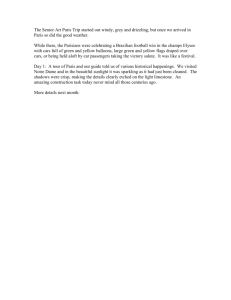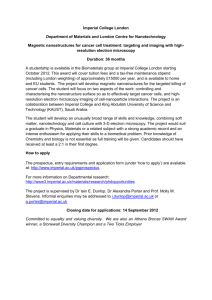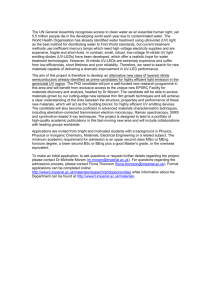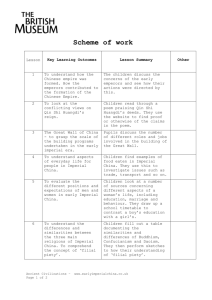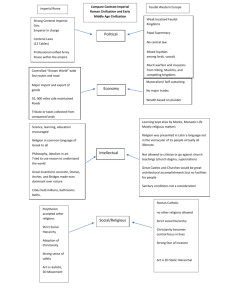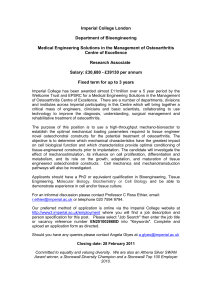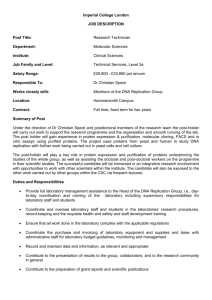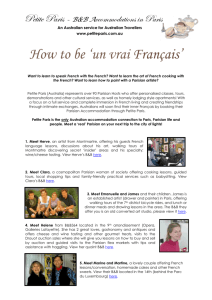A Parisian Ho Chi Minh Trail: Writing Global History Through
advertisement
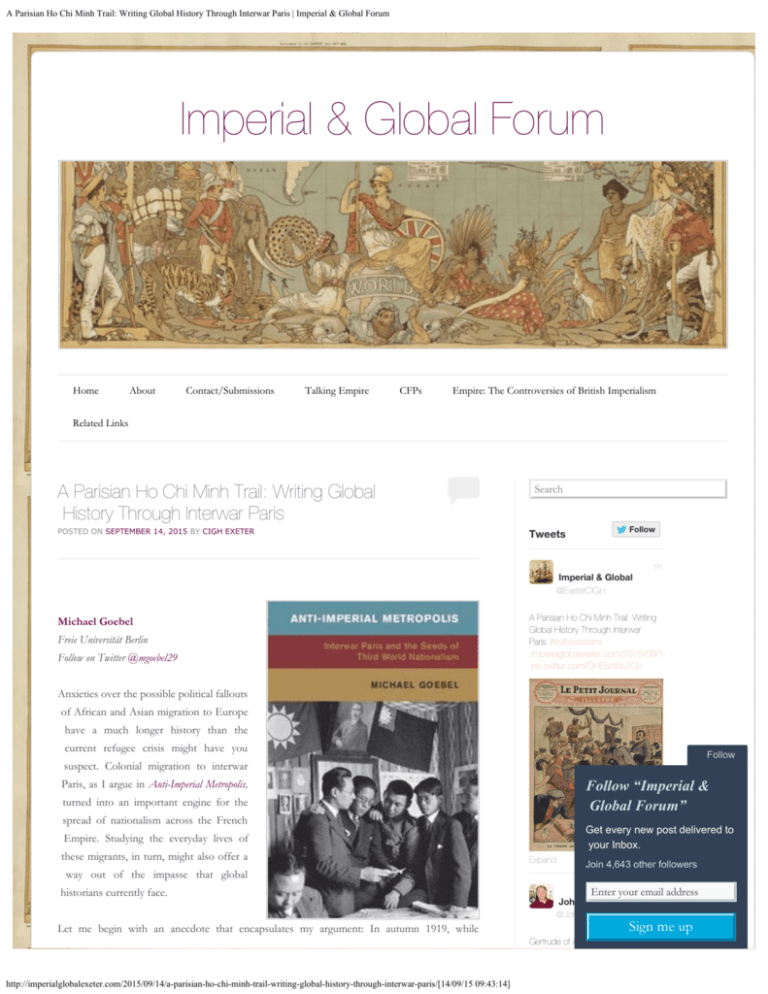
A Parisian Ho Chi Minh Trail: Writing Global History Through Interwar Paris | Imperial & Global Forum Imperial & Global Forum Home About Contact/Submissions Talking Empire CFPs Empire: The Controversies of British Imperialism Related Links A Parisian Ho Chi Minh Trail: Writing Global History Through Interwar Paris POSTED ON SEPTEMBER 14, 2015 BY CIGH EXETER Search Tweets Follow Imperial & Global @ExeterCIGH Michael Goebel Freie Universität Berlin Follow on Twitter @mgoebel29 1h A Parisian Ho Chi Minh Trail: Writing Global History Through Interwar Paris #twitterstorians imperialglobalexeter.com/2015/09/14 pic.twitter.com/OHE5oWuTGV Anxieties over the possible political fallouts of African and Asian migration to Europe have a much longer history than the current refugee crisis might have you Follow suspect. Colonial migration to interwar Paris, as I argue in Anti-Imperial Metropolis, Follow “Imperial & Global Forum” turned into an important engine for the spread of nationalism across the French Get every new post delivered to your Inbox. Empire. Studying the everyday lives of these migrants, in turn, might also offer a way out of the impasse that global historians currently face. Let me begin with an anecdote that encapsulates my argument: In autumn 1919, while http://imperialglobalexeter.com/2015/09/14/a-parisian-ho-chi-minh-trail-writing-global-history-through-interwar-paris/[14/09/15 09:43:14] Expand Join 4,643 other followers 11h address Enter your email John Robertson @JohnFRobertson Sign me up Gertrude of Arabia: The ‘Queen of A Parisian Ho Chi Minh Trail: Writing Global History Through Interwar Paris | Imperial & Global Forum statesmen gathered in Paris’s upscale banlieues to redraw the political world map, local police hired a discharged Vietnamese adjutant as an undercover agent. His task was “to exercise a discrete surveillance” over a compatriot of his who had distributed leaflets entitled “The Demands of the Annamite People” among diplomats and informal spokesmen in the city’s shabbier neighbourhoods. the Desert’ Who Dreamed Up Iraq Build a website with WordPress.com The Daily Beast thedailybeast.com/articles/2015/… Retweeted by Imperial & Global Show Summary The newly enlisted informer took his assignment very seriously. He filed daily reports on just about every movement in the city’s Vietnamese community, producing a paper trail that can now only be traced through the National Archives in Paris and in the Colonial Archives in Aixen-Provence. Follow Blog via Email Enter your email address to follow this blog Figuring out the author (or authors) of the incendiary leaflets in 1919 proved and receive notifications of new posts by email. tricky. Police only had a name to begin with—“Nguyen Ai Quoc.” The agent Enter your email address noted that this was surely a byname, as it meant merely “Nguyen who loves his country,” and that several Vietnamese Follow men who lived at the same address in the thirteenth Parisian arrondissement (6 Villa des Gobelins) had written Follow on Facebook pamphlets signed with this name, collectively calling themselves “Group of The Imperial & … 853 likes Annamite Patriots.” His superiors, however, became riveted to an especially bustling “intelligent “Demands of the Annamite People”: Addressed to Woodrow Wilson’s Secretary of State, Robert Lansing, the document is sometimes taken as the birth certificate of Vietnamese nationalism, but it stopped short of demanding national sovereignty for Vietnam Like Page Share 1 young man,” who eventually professed to the agent to be the Nguyen Ai Quoc named on the document. Police henceforth considered the question of authorship settled, helping the mystery man build an ever-growing political reputation among his Parisian compatriots. Recent Posts This Week’s Top Picks in Imperial & Global History What was the Role of Scientific and Years later, after several celebrated episodes of escaping the French authorities, the same man reinvented himself as Ho Chi Minh and shrouded his peripatetic past in ever more mysteries. As Vietnam just marked the seventieth anniversary of the 1945 declaration of independence, the cult surrounding “Uncle Ho” still appears to be on the rise. The Local and Global of Colonial Migration Historians have treated Ho’s alleged penning of the “Demands of the Annamite People” as the Technical Intelligence During World War II? This Week’s Top Picks in Imperial & Global History Empire: The Controversies of British Imperialism – Free Online Course birth hour of modern Vietnamese nationalism, but have rarely paused to consider the local This Week’s Top Picks in Imperial & context in which the leaflet emerged. In spite of two decades of pleas to examine how the Global History global manifests itself in the local and vice versa, documents such as this one are the mainstay of the intellectual and political histories of nationalism in the countries of the global south, yet their protagonists all too often appear aloof from the social world surrounding them. Attention to this local context can tell us a great deal about the global spread of nationalism in the twentieth century. http://imperialglobalexeter.com/2015/09/14/a-parisian-ho-chi-minh-trail-writing-global-history-through-interwar-paris/[14/09/15 09:43:14] Tags Africa AHRC Algeria Allende American Empire A Parisian Ho Chi Minh Trail: Writing Global History Through Interwar Paris | Imperial & Global Forum Postcolonial political and intellectual elites had spent formative stints in imperial centres such as Andrew Paris for a variety of reasons, but two stand out. The first has to do with the history of colonial Movement Anti-Imperialism Apartheid Archives migration. As France had recruited three quarters of a million colonial soldiers and workers Bandung Book Review British during World War I and thereafter drew a steady trickle of labour migrants from its overseas Centre for Imperial & Global History Centre for Imperial empire, the origins of postcolonial Paris hark back one hundred years. By 1930, roughly 70,000 North African Muslims and perhaps 15,000 other colonials lived in the Paris region—almost all of them young and male. Their sojourns in the metropole familiarized them with a comparatively permissive political climate, but also highlighted the steep gap in rights that yawned between full French citizens and colonial subjects. Thompson Anti-Apartheid Empire and Global History Centre for War State and Society CFP Chris Dietrich Cold War Colonialism Conference Cuba Embargo David Thackeray Decolonisation Decolonization Emily Bridger Evan Smith Fabian Klose First World War Free Trade French Empire Gareth Curless Germany Global History Global Humanitarianism Research Academy Globalization Global South Guardian Historiography History & Policy Humanitarianism Humanitarianism and Human Rights Human rights Imagining Markets Imperial and Global History Network Imperial History Imperialism International Committee of the Marc- Red Cross James Mark Jobs William Palen Martin Thomas Michael Gove Nandini Chatterjee Nelson Mandela Neoliberalism PhD Funding Pickering and Chatto Podcast Richard Drayton Richard Toye Samuel Moyn Second World War South Top Africa Stacey Hynd Talking Empire Picks in Imperial & Global History Top Ten Toynbee University of Exeter Prize Foundation Vietnam Vietnam War Winston Churchill World War II World War One Archives Le Petit Journal, La chasse aux indésirables dans un bal-musette. This 1926 cover of a popular Parisian magazine, entitled “Hounding Undesirables at a Music Club,” indicates the policing anxieties that colonial migration to Paris evoked. This inconsistency produced a plethora of migrant advocacy groups, student associations, and mutual-benefit societies replete with an ethnic press. Catering to the everyday needs and concerns of colonials in the metropole, the spokesmen of these groups also claimed to September 2015 August 2015 July 2015 June 2015 represent their disenfranchised countries of origin. Drawing this connection was far from unrealistic, as they noted that many of the problems they encountered in their lives in France were ultimately attributable to the pitfalls of a wider imperial system. In the above-cited conversation with the undercover police agent, for example, Nguyen Ai Quoc constantly http://imperialglobalexeter.com/2015/09/14/a-parisian-ho-chi-minh-trail-writing-global-history-through-interwar-paris/[14/09/15 09:43:14] May 2015 April 2015 A Parisian Ho Chi Minh Trail: Writing Global History Through Interwar Paris | Imperial & Global Forum jumped between local concerns, such as a cemetery for fallen Vietnamese soldiers in a Paris March 2015 suburb, and global geopolitics, such as Japan’s or France’s territorial gains at the negotiation February 2015 table of the peace conference. The “Demands of the Annamite People” typically arose out of a group effort. The pattern was similar across different communities. North Africans and West Africans, Malagasies and January 2015 December 2014 Antilleans, all had their own ethnic associations and periodicals in Paris, which claimed greater rights—and sometimes even national independence—for themselves. Likewise, Chinese worker-students founded welfare societies and local communist party branches, from which later leaders such as Zhou Enlai and Deng Xiaoping hailed. Like the “Annamite Patriots,” they gathered at particular Parisian addresses, to which newcomers were pulled upon their arrival in November 2014 October 2014 September 2014 the French capital. Steady back-and-forth movements tied specific places of origin with specific places in the Parisian cityscape, as is common for migratory processes in general. The Cosmopolitanism of Interwar Paris August 2014 July 2014 June 2014 The second reason was that the unique cosmopolitan environment of interwar Paris—and especially the Latin Quarter—facilitated ideological pollination across ethnic boundaries. “Monsieur Nguyen Ai Quoc,” the undercover informer reported on New Year’s Eve 1920, “bases himself on everything the Koreans do. He has almost exactly followed the plan of the Korean rebels.” The Vietnamese activist, meanwhile, compared his people’s fate to that of his May 2014 April 2014 March 2014 Parisian neighbours. “The Annamites wish nothing but to see France treat them like other peoples, at least like Tunisians and Algerians,” he allegedly said once. With the support of the French Communist Party, which he had joined at its founding congress in Tours in 1920, the later Ho Chi Minh went on to found a political group called Intercolonial February 2014 January 2014 December 2013 Union, which specialized in this kind of extrapolating from one colonial context to another. Apart from the “Annamite Patriots,” Antillean lawyers who lobbied for the extension of French citizenship to Malagasy war veterans joined the Intercolonial Union. Nguyen Ai Quoc (the later Ho Chi Minh) speaking at the foundational congress of the French Communist Party, Tours, December 1920. http://imperialglobalexeter.com/2015/09/14/a-parisian-ho-chi-minh-trail-writing-global-history-through-interwar-paris/[14/09/15 09:43:14] November 2013 A Parisian Ho Chi Minh Trail: Writing Global History Through Interwar Paris | Imperial & Global Forum Flyer of the Intercolonial Union, 1925. Like many such flyers, this one had a multinational audience, but by addressing them as separate nationalities, it reinforced the notion of a world divided into structurally symmetric nations. Here again, rights differentials between colonials of different origins fanned mutual learning curves and the transmission of particular political demands—most notably the call for national sovereignty—from one context to another. The Intercolonial Union churned out some of the leading anticolonialists from across the French Empire, as well as key speakers at the 1927 Conference of the League against Imperialism, which is now widely considered as an antecedent of the Bandung Conference sixty years ago. Conclusion Apart from telling us something about the genealogy of Third World nationalism, the history of anti-imperialism in interwar Paris also speaks to the dilemmas of the growing field of global history that are currently being debated. In order to avoid the risk of diminishing returns through imperial overstretch, of which David Bell warns us, the kind of urban social history I propose offers a way of mooring a question about “motors of change”—here the global spread of nationalism—in the local experience of concrete and identifiable individuals. It may thus serve as an antidote to taking too literally the “global” in “global history.” Professor Michael Goebel is the author of Anti-Imperial Metropolis: Interwar Paris and the Seeds of Third World Nationalism (Cambridge University Press, 2015). Be sure to also watch this interview http://imperialglobalexeter.com/2015/09/14/a-parisian-ho-chi-minh-trail-writing-global-history-through-interwar-paris/[14/09/15 09:43:14]
